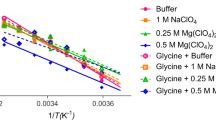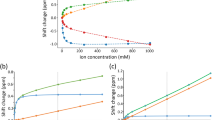Abstract
A GROUP of hereditary non-spherocytic anaemias have been shown to be associated with unstable haemoglobins through the application of a simple screening test for thermolability involving incubation of haemolysate at 50° C in phosphate buffer (pH 6.5–7.4; 0.1 M)1–3. Unstable haemoglobins form a precipitate within a few hours but normal haemoglobin remains in solution. We have encountered two families with this type of anaemia whose haemoglobins demonstrated little or no precipitate in these conditions, but formed copious precipitate in the presence of non-phosphate buffers—observations which led us to wonder whether the recently described effects of phosphates on the oxygen-binding properties of haemoglobin4–7 might not also modify the heat stability of the molecule.
This is a preview of subscription content, access via your institution
Access options
Subscribe to this journal
Receive 51 print issues and online access
$199.00 per year
only $3.90 per issue
Buy this article
- Purchase on Springer Link
- Instant access to full article PDF
Prices may be subject to local taxes which are calculated during checkout
Similar content being viewed by others
References
Grimes, A. J., and Meisler, A., Nature, 194, 190 (1962).
Grimes, A. J., Meisler, A., and Dacie, J. V., Brit. J. Haemat., 10, 281 (1964).
Dacie, J. V., Grimes, A. J., Meisler, A., Steingold, L., Hemsted, E. H., Beaven, G. H., and White, J. C., Brit. J. Haemat., 10, 388 (1964).
Chanutin, A., and Curnish, R. R., Arch. Biochem. Biophys., 121, 96 (1967).
Benesch, R., and Benesch, R. E., Biochem. Biophys. Res. Commun., 26, 162 (1967).
Benesch, R., Benesch, R. E., and Yu, C. I., Proc. US Nat. Acad. Sci., 59, 526 (1968).
Benesch, R., Benesch, R. E., and Enoki, Y., Proc. US Nat. Acad. Sci., 61, 1102 (1968).
Lehmann, H., and Carrell, R. W., Brit. Med. Bull., 25, 14 (1969).
Carrell, R. W., and Lehmann, H., Seminars in Hematology, 6, 116 (1969).
Weiss, J. J., Nature, 202, 83 (1964).
Bunn, H. F., and Jandl, J. H., Proc. US Nat. Acad. Sci., 56, 974 (1966).
Jones, R. V., Grimes, A. J., Carrell, R. W., and Lehmann, H., Brit. J. Haemat., 13, 394 (1967).
Fanelli, A. Rossi, and Antonini, E., Biochim. Biophys. Acta, 30, 608 (1958).
Rapoport, S., and Guest, G. H., J. Biol. Chem., 138, 269 (1941).
Oshima, M., Taylor, T. G., and Williams, A., Biochem. J., 92, 42 (1964).
Author information
Authors and Affiliations
Rights and permissions
About this article
Cite this article
SCHNEIDERMAN, L., JUNGA, I. & FAWLEY, D. Effect of Phosphate and Non-phosphate Buffers on Thermolability of Unstable Haemoglobins. Nature 225, 1041–1042 (1970). https://doi.org/10.1038/2251041a0
Received:
Revised:
Issue Date:
DOI: https://doi.org/10.1038/2251041a0
This article is cited by
-
A substitution of cytosine for thymine in codon 110 of the human ?-globin gene is a novel cause of ?-thalassemia phenotypes
Human Genetics (1988)
-
A swiss family with hemoglobin P Galveston 61-161-161-1, including two patients with Hb P/β thalassemia
Blut Zeitschrift für die Gesamte Blutforschung (1975)
Comments
By submitting a comment you agree to abide by our Terms and Community Guidelines. If you find something abusive or that does not comply with our terms or guidelines please flag it as inappropriate.



